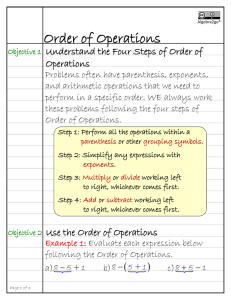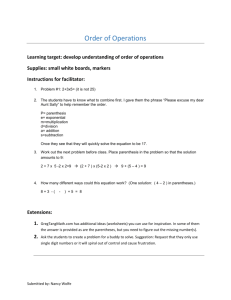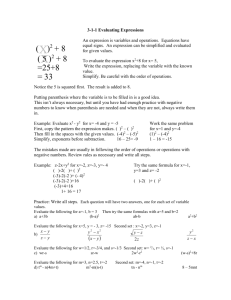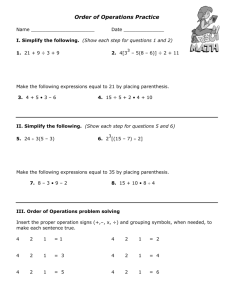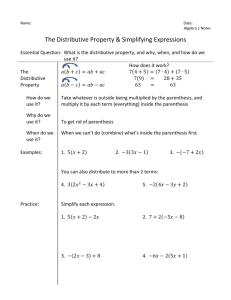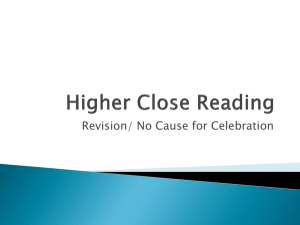Close Reading – Sentence Structure
advertisement
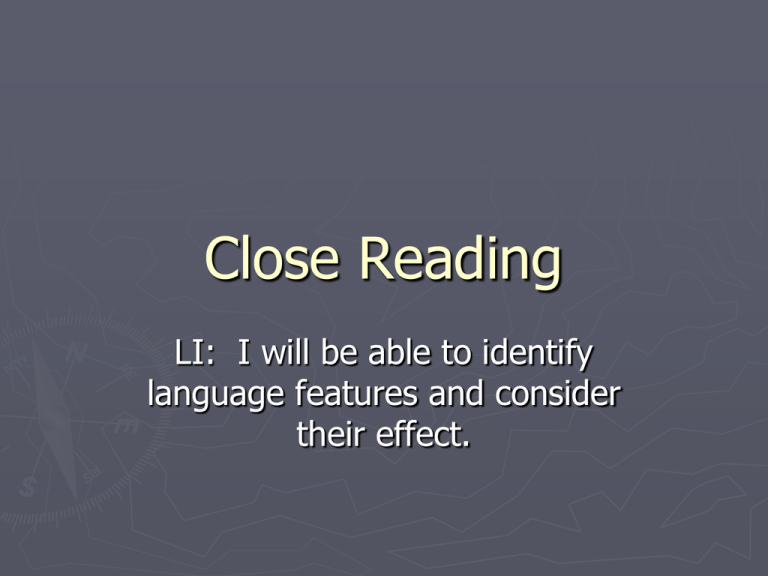
Close Reading LI: I will be able to identify language features and consider their effect. The Code ►U – understanding ► A – analysis ► E – evaluation Understanding These are basically what questions! You are being tested on how well you understand the points made by the writer of the passage. Look out for words such as ‘explain’ or ‘line of thought’ in the question. You need to use your own words for these questions!! Your answers for understanding questions do not need to be complex. The point of them is to show that you can paraphrase or describe in your own words. Understanding questions may ask you to summarise key points from a passage. For questions like these it is acceptable to write in note form or use bullet points. Analysis These are basically how and which technique questions. You are being asked to show how writers use particular techniques to get their points across effectively. Look out for words such as ‘show how’ or ‘the effect of’. You score 0 for picking out the words/techniques, all your marks depend on the quality of your comment. Evaluation These are how well questions. You are given the opportunity to express your opinion about the ideas and/or styles of writing in the passages. Look for words such as ‘how effective’ or ‘to what extent’. You need to give a considered opinion that continually refers to the passage. The Marks ► How many marks is a question worth? ► Make sure the depth of your answer is suitable ► Never assume you will get a mark for a quotation and a mark for your analysis ► 1 quote+comment = a mark ► Cover your own back! Basically……… ► You have to read a passage, think about how and why it has been written and answer questions on it. Language ► Sentence structure ► Imagery ► Word ► Tone choice Sentence structure Questions ► If you’re being asked about the effect of sentence structure, chances are you’re being asked about something that you’ll have noticed already. ► They are not trick questions. ► Something obvious will be happening. You just need to look for it! ► You then need to decide what the effect is! Most common things to look for…. ► Repetition ► Word order (Inversion) ► Types of sentences ► Punctuation ► Patterns ► Climax ► Parenthesis ► Lists Sentence structure tasks Name the types of sentences there are. How do you recognise these types of sentences? What do they do? 2. Name all of the punctuation marks there are. What do they do? 1. Statements Exclamations Minor Sentences Commands Questions Parenthesis ►A parenthesis is an extra piece of information inserted into a sentence and enclosed by a pair of commas, brackets or dashes. ► A parenthesis may add significant detail or make something more clear. ► A parenthesis may affect the tone by adding a comment, which might be humorous or ironic. ► The writer may put an ‘aside’ in parenthesis to show their true opinion. ► If a parenthesis were removed from the sentence, it would still make sense. ► Commas (,) separate phrases and clauses within a sentence, divide a list. When I went to Tesco I bought bread, jam, eggs, milk, apples, sugar and tea. Everyone was in there. Gran, Grandad, Auntie Millie, Uncle Gary, Susan and even the twins! ►A colon (:) introduces a quotation or a list; an explanation or elaboration; or a summing up. To use it, the part after the colon CANNOT make sense on its own. It was a dull day in London: rain poured, clouds hovered and people dragged themselves down the streets. ►A semi-colon (;) finishes off one part of the sentence. It may be used instead of a conjunction to separate two principle clauses in a sentence. Both sides of the semi-colon must make sense on their own. I was astounded that he had found me; I had always been so careful. The whole Milton family arrived: Gran and Grandad had come from Aberdeen; Auntie Millie had driven all the way up from Leicester; Uncle Gary and Susan had taken the weekend off work; and even the twins had flown in from France! There were further, smaller parts to be played in the gently rolling drama of this morning. There was a second maid, but, unlike Marguerite, she did not live in the house; There was a cook, who had a room ► Inverted commas (‘ ’) or (“ ”) mark quotations, direct speech, foreign words or words used in an unusual way. (Italics may be used similarly) When Proctor screams ‘God id dead!’ the audience is shocked and worried. This phenomenon of ‘tweeting’ will die away like all the other fads. ►A dash (-) can function like a colon to introduce a quotation, list, explanation, elaboration or summing up; two dashes can mark off a parenthesis. I ran and ran all the way to the hospital – but it was too late. I demanded a better explanation – he said that this was life. He rolled him eyes – like he always did – and sighed. Do not………… ► Give vague answers about the effect of the sentence structure. ► We all know that parenthesis adds extra information. You have to be more specific in your answers. What is the extra information, why do we need it, how does it affect the reader etc? ► Lots of commas might increase the pace but what is the effect? Excitement, panic, anger? ► Do not answer on imagery, word choice etc if you are being asked about sentence structure! Do……. ► Be specific ► Give examples ► Explain the effect ► Answer the question Formula 1. Identify the technique first. 2. Quote or describe the features of the technique. 3. Explain the effects of the technique. (Remember in many of these questions you are told the effect- your task is to explain how it is created) What do you notice about the sentence structure? ► Kerry, 28, who dropped from a size 14 to a size 10 last year after a $15000 surgery makeover, has ditched her healthy eating and exercise regime and has put on almost a stone in four weeks. What do you notice about the sentence structure? ► Kerry, 28, who dropped from a size 14 to a size 10 last year after a $15000 surgery makeover, has ditched her healthy eating and exercise regime and has put on almost a stone in four weeks. ► Q: How is the writer’s opinion of Kerry expressed through sentence structure? 2 Marks are rewarded for identifying the correct opinion, identifying the techniques (with evidence) and explaining it correctly ► Kerry, 28, who dropped from a size 14 to a size 10 last year after a $15000 surgery makeover, has ditched her healthy eating and exercise regime and has put on almost a stone in four weeks. ► The writer is disdainful/has a disrespectful attitude towards Kerry. The use of parenthesis ‘who dropped from a size 14…surgery makeover’, suggests Kerry did not work hard to lose weight and that her now giving up her healthy lifestyle is ungrateful and irresponsible so the writer has no respect for her. You wouldn’t believe Gillian is her sister. Her lack of make up and scraped back hair age her by over a decade, and her scruffy clothes drown her hair and femininity. She could be Cheryl’s mum! You wouldn’t believe Gillian is her sister. Her lack of make up and scraped back hair age her by over a decade, and her scruffy clothes drown her hair and femininity. She could be Cheryl’s mum! Q: How are the writer’s feelings towards Gillian conveyed by sentence structure? ► You wouldn’t believe Gillian is her sister. Her lack of make up and scraped back hair age her by over a decade, and her scruffy clothes drown her hair and femininity. She could be Cheryl’s mum! ► The writer feels shocked that Gillian, who is a young woman, looks so old and terrible. The exclamation at the end of the paragraph ‘She could be Cheryl’s mum!’ helps to convey this surprise. She does not do any of the things people normally do to make themselves look presentable. ► Shame on you if you expressed gratitude for a Christmas gift by firing off a quick e-mail. If you sent a text, you should be flayed. Anything but a handwritten thank-you letter is idleness, ill manners and ingratitude. ► Shame on you if you expressed gratitude for a Christmas gift by firing off a quick e-mail. If you sent a text, you should be flayed. Anything but a handwritten thank-you letter is idleness, ill manners and ingratitude. Q: How does the sentence structure in this paragraph convey the writer’s opinion of those who do not send thank you letter? 2 ► Shame on you if you expressed gratitude for a Christmas gift by firing off a quick e-mail. If you sent a text, you should be flayed. Anything but a handwritten thank-you letter is idleness, ill manners and ingratitude. ► The writer thinks that not sending thank you letters in rude. This is reinforced by the list/triad at the end of the paragraph ‘idleness, ill manners and ingratitude.’ The list reinforces just had terribly disrespectful she thinks this is. The use of alliteration helps to highlight this point to the reader. Word Choice ► Questions relating to expression and WC look at the effect created by the particular choices of the writer. ► you are simply being asked to look at the words and see why the writer has chosen those particular words to describe some thing or some feeling, rather than any similar words. ► You have to consider the connotations of the word choice. ► Connotations are the things associated with a particular word. ► E.g. what are the connotations of the word ‘bar’? ► Emotive language: words which stir up strong emotions. ► Used if a writer is talking about something tragic. ► E.g. ‘shocking’, ‘horrifying’ and ‘appalling’ express stronger feelings than ‘worrying’ or ‘upsetting’. ► Emotive language plays on the emotions of his readers. Word Choice ► Writers manipulate words and their readers ► They choose words over others to convey their meaning further without having to state the obvious ► There are many words in the English language that mean the same thing so why are some favoured over others? Because of their connotations... Word Choice What are the connotations of the following words? ► Secret ► Rat ► Discovery ► Angel ► Farm Think of another word for.............. ► Quiet ► Fun ► Sad ► Chat What are the connotations of these words? Quiet Nothing out of the ordinary, there was simply no noise as it wasn’t necessary to the situation, peaceful and calm atmosphere Silent The atmosphere was tense and eerie, perhaps suggesting feelings of fear or nerves, suggests that the lack of noise is insisted upon Fun The experience or feeling is of happiness, people are enjoying themselves doing something nice Exciting The experience is more thrilling and unique, adrenaline is running and Sad The person is upset and has been troubled by something but will be able to move on Distraught The person is uncontrollable, consumed with overwhelming feelings of distress, finding it difficult to function Chat Informal term, suggesting friends are talking about trivial matters in a lighthearted nature Discuss Formal term, suggesting a formal situation in which a serious matter is talked about, taking account of all opinions Out of context connotations ‘And then after lunch I read a book.’ ‘Something educational, or one of your novels?’ ‘Just a silly thing I find in a bookshop in town.’ Azaire smiled indulgently and shook his head at his wife’s frivolous tastes. He himself, it was assumed, read only the Greek philosophers, often in their original languages, though this arduous study must have taken place and private. When he settled in beneath the glow of the lamp after dinner, his hand invariably reached out for the evening paper. Any good words here? Poor Jamie Oliver. A few years ago he single-handedly saved every child in the country from imminent cholesterol death with his school dinners campaign. And there was nationwide rejoicing. The Queen called a national holiday, councils held street parties in his honour and the City erected a 600ft glass-and-metal statue in the shape of one of his Flavour Shakers (known today as "the Gherkin", after one of his favourite sandwich fillings). Word Choice single-handedly imminent cholesterol death nationwide rejoicing national holiday councils held street parties in his honour Analysis HW Task Complete the following table using your own 5 words in order to show how the connotations of similar words can convey different meanings. Original word Connotations Alternative word Connotations Charlie Brooker ► Opinionated ► Funny ► Columnist for The Guardian ► TV presenter ► We will read, annotate and analyse his article: The 80mph speed limit is a waste of time We don't need more speed. We need more dawdling Brooker! Task: ► Read the article thoroughly ► Summarise the function and content of each paragraph ► For example, paragraph 1’s content introduces the topic of men driving too fast and states the 2 basic reasons why they do it. The function is to engage the reader quickly using humour. Word Guessed meaning Context clues Dictionary definition ► Highlight any effective examples of word choice and sentence structure ► Write detailed notes about the effect of your example Consider......... ► What Brooker’s opinions are ► How he conveys these opinions through his use of language Paired Task ► Analyse your section in detail. ► As well as sentence structure, consider all aspects of language when possible. ► Be prepared to discuss your ideas with the class. ► Everyone knows there are only two kinds of men who feel the need to drive fast: professional racers and the poorly endowed. Sorry, but those are the facts. ► Anyway, I'm getting off the (teeny tiny) point here. The reason I bring this FACT (and it is a FACT) to your attention is the government's plan to raise the motorway speed limit to 80mph, which is misguided for two reasons. Firstly because it'll make Jeremy Clarkson smile, which is always a reliable barometer for bad policies. But mostly because it's just not necessary. ► I understand why they're doing it – it's a brazen attempt to capture the seething male vote, and that's an important group to placate, because let's face it, those guys are as furious as they are unpredictable – but it seems curiously self-defeating. Part of the argument for raising the permitted figure to 80mph is that lots of people break the existing 70mph limit: roughly half of all motorway drivers, in fact. Why are they driving that fast? The government seems to earnestly believe these people are in a hurry, which is terribly sweet of them, but we all know that isn't the reason. It's to do with pushing the limit, with gently breaking the law. I can't drive a car – I'm an inferior human being – but even I understand the psychology of the accelerator pedal. If cars came with two speeds – 30mph or 90mph, and the only way to switch between them was by pushing an instant "break the speed limit" button, drivers might think twice about doing so. But that pedal, that incremental, giving pedal … it almost encourages you to push your luck. ► Another dumb thing the dumb government seems to dumbly believe is that raising the speed limit will boost the economy. According to transport secretary Philip Hammond, "increasing the motorway speed limit to 80mph would generate economic benefits of hundreds of millions of pounds through shorter journey times". I don't think he actually said those words out loud. I think he physically carved them, letter-by-letter, out of pure horses**t. If Hammond honestly thinks "shorter journey times" are the key to fixing the economy, why hasn't he kickstarted a campaign encouraging us to take bigger, brisker strides? Why isn't he issuing us all with stilts? Why isn't he touring the nation, sawing off our children's feet and replacing them with wheels? There are only two possible explanations: either he doesn't care about our economic wellbeing or he knows damn well he's talking through his hat. Which he wears up his backside. ► ► Incidentally, as well as raising the upper limit to 80mph, he is also increasing the number of 20mph zones. So you'll be hearing far more screeching brakes in future. Don't worry, eventually it'll blend unnoticed into the background, like birdsong or gunfire. The current situation, in which the official limit is 70mph, but which half the population pushes to somewhere around 80mph when they think they can get away with it, seems like a fair compromise. The 70-80mph buffer zone of cheeky lawlessness seems about right. Why punch it higher? If anyone really, really wants to drive faster than that, they could visit a test track, play Need for Speed, or simply risk it and swallow the consequences. It's useless in everyday life. Unless you're delivering urgent donor organs, you don't need to reach your destination that quickly. And if you think you do, either set out earlier, or spend less time browsing for "Grab Bag" size packs of Quavers at the service station. ► And besides: zooming petrolheads already have it their own way on the roads: aggressively driving up other peoples' behinds, bleating away with their horns, flashing their lights … seriously, what's wrong with you people? The anger and the obvious raging inadequacy seems so … raw. Do you need a cuddle, is that it? Should we designate special laybys to be used for cuddle-breaks, just to calm you down? Fair enough. If that's what it takes to get people to slow down, it's fine by me. Because there's too much bad-tempered showboating on the roads, and not enough amiable sauntering. When I become minister for transport, I'll introduce a new motorway lane specifically designed for 19th-century horse-drawn hay carts – a lane that criss-crosses all the other lanes at random intervals. I'd also position a sniper on every bridge and instruct them to blow the head off anyone who looks like they're getting a bit of speed up. Or anyone who looks like they're enjoying the road a bit too much for my liking. Or anyone listening to an album I hate. Or wearing a loud shirt. Or who might be Sagittarian. ► Basically anyone. Anyone in a car. Or near a car. Or who looks like they're thinking about cars. ► Hey, I'm just trying to offer solutions here. If you don't like it – leave. Leave now. Get out. Get out of this article this instant. ►

